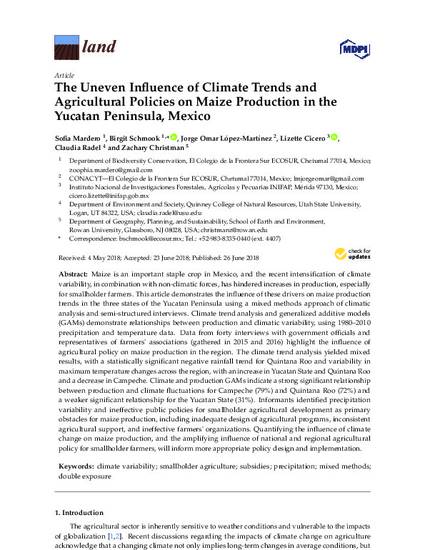
Maize is an important staple crop in Mexico, and the recent intensification of climate variability, in combination with non-climatic forces, has hindered increases in production, especially for smallholder farmers. This article demonstrates the influence of these drivers on maize production trends in the three states of the Yucatan Peninsula using a mixed methods approach of climatic analysis and semi-structured interviews. Climate trend analysis and generalized additive models (GAMs) demonstrate relationships between production and climatic variability, using 1980–2010 precipitation and temperature data. Data from forty interviews with government officials and representatives of farmers' associations (gathered in 2015 and 2016) highlight the influence of agricultural policy on maize production in the region. The climate trend analysis yielded mixed results, with a statistically significant negative rainfall trend for Quintana Roo and variability in maximum temperature changes across the region, with an increase in Yucatan State and Quintana Roo and a decrease in Campeche. Climate and production GAMs indicate a strong significant relationship between production and climate fluctuations for Campeche (79%) and Quintana Roo (72%) and a weaker significant relationship for the Yucatan State (31%). Informants identified precipitation variability and ineffective public policies for smallholder agricultural development as primary obstacles for maize production, including inadequate design of agricultural programs, inconsistent agricultural support, and ineffective farmers' organizations. Quantifying the influence of climate change on maize production, and the amplifying influence of national and regional agricultural policy for smallholder farmers, will inform more appropriate policy design and implementation.
